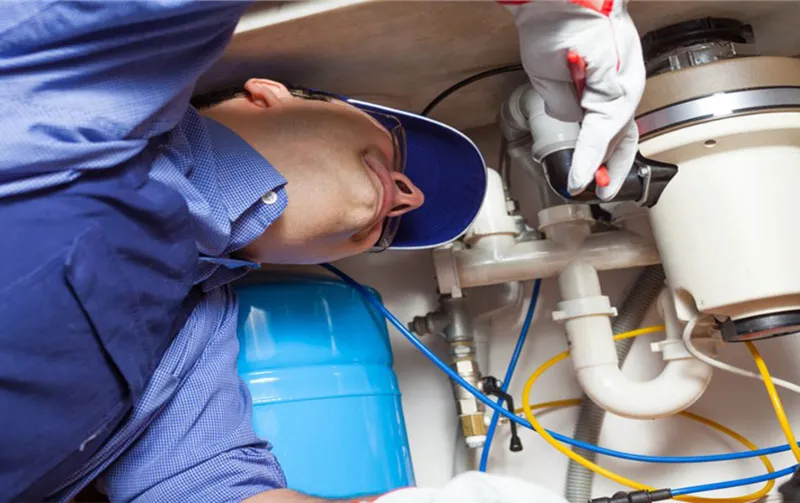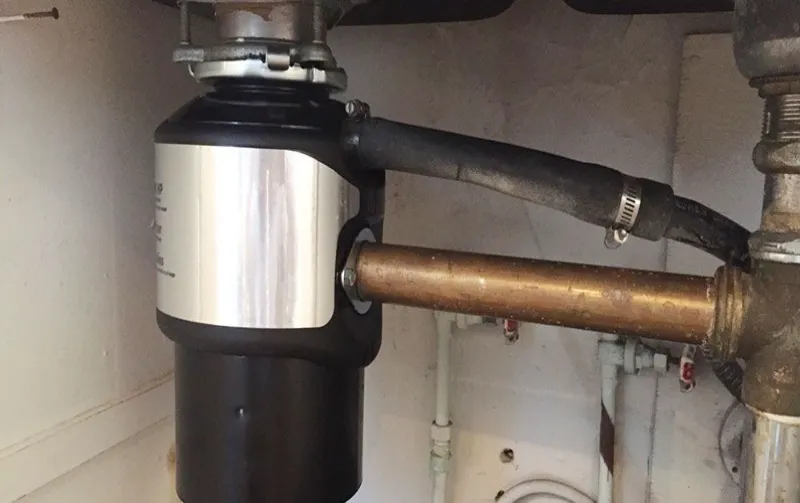Can You Use Dishwasher With Broken Disposal: Safe Tips
We may earn affiliate fees for purchases using our links (at no additional cost to you).
Using a dishwasher with a broken garbage disposal is not recommended. A malfunctioning disposal can cause clogs and hinder dishwasher performance.
Operating a dishwasher with a broken garbage disposal can lead to plumbing issues, impacting your kitchen’s functionality.
The garbage disposal and dishwasher often share a common drain path, and a compromised disposal might cause backup or standing water issues, potentially damaging both appliances.
Additionally, food particles that normally break down in a working disposal could now block the shared drain, causing unpleasant odors and health hazards.
Homeowners should address broken disposal promptly to maintain an efficient kitchen environment and protect the longevity of their appliances.
Ensuring these systems work correctly can save time, prevent costly repairs, and maintain optimal hygiene levels in your home.

Risks Of Using Dishwasher With Broken Disposal
Operating a dishwasher when the garbage disposal is broken may seem like a minor inconvenience, but it can actually lead to several risks that compromise the efficiency and safety of your kitchen appliances.
Understanding these risks helps in making informed decisions about the use of your kitchen equipment and maintaining a safe home environment.
Potential Water Leakage
Water leaks can arise from using a dishwasher connected to a broken disposal.
The disposal unit is integral to the drainage system, and if it’s malfunctioning, water can back up and find its way into areas it shouldn’t. This could cause:
- Wet flooring: increasing the risk of slips and falls.
- Moisture damage: to cabinetry or flooring materials.
- Mold growth: a conducive environment for harmful bacteria and allergens.
Damage To The Dishwasher
Using a dishwasher with a broken disposal could also be counterproductive and lead to premature wear and tear on the appliance itself. Lack of proper drainage may cause:
- Increased strain on the dishwasher’s pump and motor.
- Potential overheating or motor failure due to the strain.
- Ineffective cleaning cycles, as dishes remain soiled with food waste.
Health Hazards
Health risks are an important consideration, as a broken disposal can lead to unhygienic conditions. Decayed food particles and stagnant water create a breeding ground for:
| Microorganisms | Health Impacts |
|---|---|
| Bacteria (e.g., Salmonella, E. coli) | Foodborne illnesses |
| Fungi | Allergic reactions |
| Pests (e.g., Insects) | Spread of disease |
Such conditions are not only detrimental to health but can also significantly impact the comfort of your living space.
In summary, caution should be exercised when the garbage disposal unit is not functioning.
The risks associated with using a dishwasher under these circumstances can lead to expensive repairs, health issues, and inconvenient cleanup efforts.
It’s essential to address any disposal system problems promptly for the continued well-being of your household and the longevity of your appliances.
Precautions Before Using Dishwasher
The convenience of modern appliances often leads us to overlook their need for maintenance and the importance of handling malfunctions promptly.
If you’re facing a scenario where your dishwasher disposal is broken, taking precautions before running another cycle is crucial to avoid further damage to your dishwasher or plumbing.
Proper inspection and cleaning of both your disposal and dishwasher interior can save you from a potential mishap.
Inspection Of The Disposal
Assess the damage: Begin by assessing the extent of the damage to your disposal.
Look for any apparent signs of wear or damage that could affect your dishwasher’s performance.
Is it a minor issue or something that requires immediate professional attention? This determination is imperative.
Check for foreign objects: Sometimes, disposals break due to objects that have been unintentionally dropped in.
These objects could obstruct water flow or damage the blades. Ensure no foreign materials are present before proceeding.
Review the connection: Confirm the disposal’s connection to the dishwasher is intact.
The hose linking the dishwasher to the disposal should be secure to prevent leaks or water backing up into the dishwasher.
Cleaning The Dishwasher Interior
Cleanliness enhances functionality and prevents the growth of mold and bacteria.
It’s essential to keep the dishwasher’s interior spotless, especially when dealing with a broken disposal.
Regular cleaning ensures that any waste that might be rerouted due to the disposal’s malfunction doesn’t add to the issue.
Start by removing any food particles or residue. This can be done by running a rinse cycle without dishes or manually cleaning the filter and spray arms.
- Fill a dishwasher-safe cup with white vinegar, place it on the upper rack, and run a hot-water cycle. Vinegar will help to break down any lingering debris and eliminate odors.
- After the vinegar cycle, sprinkle a cup of baking soda across the bottom of the dishwasher and run a short, hot-water cycle. This will further clean and freshen the interior.
By following these steps carefully, you can ensure that your dishwasher remains functional and hygienic, even in the face of disposal troubles.
While a broken disposal may require professional repair, maintaining the rest of your dishwasher system can prevent additional issues from arising.
Safe Ways To Use Dishwasher Temporarily
Dealing with a broken garbage disposal can bring your kitchen routine to a grinding halt, but can you still use your dishwasher in the meantime?
Yes, using a dishwasher with a broken disposal is possible, provided you implement some temporary and safe methods to prevent clogs and further damage.
Let’s explore how you can keep your dishes sparkling clean without risking your plumbing.
Hand Rinse Dishes
Even though your dishwasher is a powerful cleaning ally, with a broken disposal, you will need to pre-rinse your dishes by hand.
This temporary fix helps to remove large food particles that could otherwise end up clogging your kitchen drain. Follow this simple process:
- Scrap off food scraps into a compost or trash bin.
- Gently rinse plates and utensils under running water to remove remaining particles.
- Load your rinsed dishes into the dishwasher as you normally would.
This extra step ensures your dishwasher can operate effectively without the aid of a functional disposal.
Regular Maintenance Tips
Maintaining your dishwasher during this time is crucial.
Regular upkeep can help prevent additional problems and prolong the life of your appliance until you can get the disposal fixed.
Here are some maintenance tips to follow:
- Inspect and clean the dishwasher filter regularly to avoid buildup.
- Ensure that the dishwasher’s drain hose is not kinked or obstructed.
- Run a dishwasher cleaning cycle with a descaling agent to clear away any residue.
- Check and clean the spray arms to ensure water can flow freely.
By adhering to these maintenance tips, you keep the dishwasher in top shape and mitigate the risk of clogs or malfunctions.

Calling For Professional Help
Experiencing issues with your dishwasher due to a broken disposal?
Before you consider using your kitchen appliances in a compromised state, it’s vital to recognize when to call in the experts.
The interconnection of your dishwasher and garbage disposal demands precise handling.
Postponing a professional examination can lead to escalating problems with potential repercussions for your home’s entire plumbing system.
Taking immediate action could save you time and money, ensuring your household routines return to normal swiftly.
Consulting A Plumber
Enlisting the services of a licensed plumber should be your first step when facing a breakdown in the garbage disposal connected to your dishwasher.
A skilled plumber can evaluate the extent of the damage and ascertain if your dishwasher can run safely without further endangering your plumbing.
Key actions a plumber might take include:
- Diagnosis of the disposal’s malfunction
- Clearing clogs or obstructions that could harm the dishwasher
- Checking for potential leaks and water damage risks
Ignoring these issues can result in water backup, poor sanitation, and even costly repairs down the line.
Therefore, it’s crucial to seek professional advice to maintain your kitchen’s functionality and hygiene.
Repairing The Disposal
If a plumber suggests repairing or replacing the broken disposal, engaging in timely service can resurrect the seamless operation of your dishwasher.
Specialist disposal repair includes multiple steps:
- Deactivating the power supply to ensure safety
- Dismantling the unit to access internal components
- Identifying and resolving technical issues or part replacements
- Reassembling and testing functionality post-repair
Trained professionals carry out these tasks with precision, guaranteeing your dishwasher runs efficiently, sans the risks of leaks or electrical mishaps.
Remember, functioning garbage disposal is not only about convenience but also about protecting the integrity of your kitchen’s plumbing.
By addressing broken disposal problems immediately, you ensure the health and efficiency of your dishwasher, keeping it in top working condition.
Upgrading Your Dishwasher And Disposal
The kitchen serves as the heartbeat of most homes, where appliances like dishwashers and garbage disposals significantly ease the domestic workload.
Upgrading your dishwasher and disposal not only enhances the functionality of your kitchen but also adds value to your home.
Whether your dishwasher can operate with a broken disposal or not, considering a comprehensive update can bring efficiency and peace to the chore of dishwashing.
Let’s dive into the benefits of modernized dishwasher features and the importance of ensuring disposal functionality.
Modernized Dishwasher Features
Contemporary dishwashers have evolved far beyond their humble beginnings.
Today’s units dazzle homeowners with an array of sophisticated features designed to provide superior cleanliness while being eco-friendly.
- Multiple wash cycle options ensure that everything from fine china to robust pots and pans can be cleaned gently yet effectively.
- Wi-Fi-enabled dishwashers allow for remote monitoring and control via smartphones, adding a layer of convenience to your kitchen routine.
- The latest models are designed to minimize water and energy consumption, reduce utility bills, and align with green living principles.
- Improved insulation and advanced motor designs make operating whisper-quiet, a blessing in open-concept homes or for late-night cycles.
Upgrading to a dishwasher equipped with these features not only streamlines the cleaning process but also adapts seamlessly to the dynamics of modern living.
Ensuring Disposal Functionality
A functional garbage disposal is integral to the smooth operation of your kitchen, particularly when it’s connected to your dishwasher. Here’s why:
- An effective disposal grinds food particles before they can clog your dishwasher’s drainage system.
- Regular use of the disposal reduces the likelihood of decaying food odors that can emanate from a dishwasher connected to a faulty disposal.
- Keeping your disposal in good working condition can prevent backups and leaks, which can be costly to repair.
Ensuring that your garbage disposal is in top condition involves:
| Checkpoints | Action Items |
|---|---|
| Blade Sharpness | Regularly check and sharpen the blades to maintain efficiency. |
| Clearance of Jams | Clear any obstructions quickly to avoid disruptions in functionality. |
| Power and Performance | Monitor for any signs of power loss or poor grinding and address promptly. |
Remember, a broken disposal can impact the effectiveness of your dishwasher, and considering a combined upgrade could be the key to ensuring a harmonious relationship between these two essential appliances.
Frequently Asked Questions For Can You Use Dishwasher With Broken Disposal
Can Dishwashers Operate Without Garbage Disposal?
Is A Broken Garbage Disposal A Safety Hazard?
What Are Alternatives To Disposal For Dishwashers?
How To Maintain Dishwasher Without Disposal?
Conclusion
Operating a dishwasher with a compromised garbage disposal isn’t ideal. It’s essential to weigh the potential risks against short-term convenience.
Prioritize repair or replacement to ensure your kitchen appliances function safely and efficiently.
For temporary solutions, consult a professional to avoid costly damage or unsafe conditions.